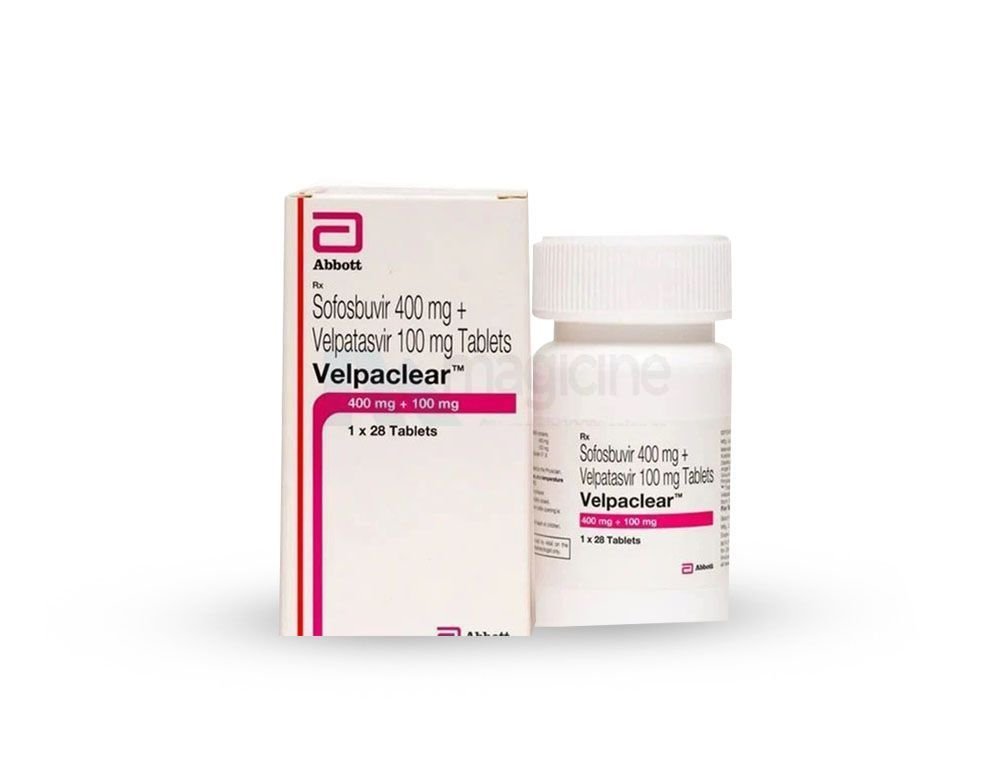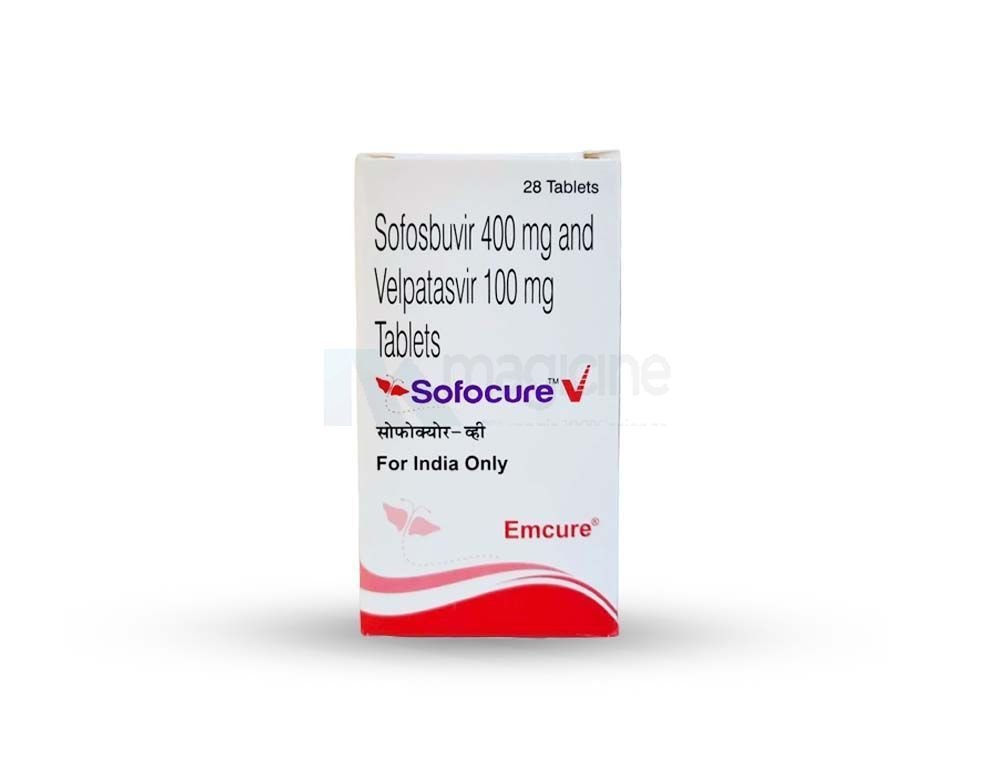Marketed By
Natco Pharma
Pack of
28 tablet
Salt Composition
Sofosbuvir and Velpatasvir
Storage
Keep in cold place
₹6200₹17500
64.57% Off
Inclusive of all taxes
1

Velpanat Tablet
Delivering To: —
All Substitutes
Overview
Two antiviral medications are combined in Velpanat Tablet. Chronic hepatitis C virus (HCV) infection is treated with this prescription medication. To get rid of the infection, it battles the viruses. Two antivirals are combined to become Velpanat. The first once-daily single-tablet therapy with pangenotypic action is a combination of Velpatasvir and Sofosbuvir.
Indication
Hepatitis C
Uses
Chronic hepatitis C virus (HCV) infection
Side Effects
Velpanat tablets may cause certain side effects. If side effects occur after administration or last longer than usual, contact your healthcare professional.
Tiredness
Cough
Lower back pain
Skin rash
Headache
Nausea
Diarrhea
Muscle pain
Cramps, Loss of appetite
Anemia
Insomnia
Blurred vision
Dosage and Administration
Take Velpanat tablets exactly as your healthcare provider tells you. Do not crush, chew, or break the tablet. Swallow as a whole. Seek emergency medical support in case of overdose.
Mechanism of action
Velpanat is a combination of velpatasvir & sofosbuvir. Sofosbuvir is a nucleotide analog NS5B polymerase inhibitor, and Velpatasvir is an NS5A replication complex inhibitor. Sofosbuvir is used in the treatment of genotype 1, 2, 3, and 4 HCV infection with different medicines, wherein the duration depends on the HCV genotype. Velpatasvir is a novel NS5A inhibitor. It has potent in vitro anti-HCV activity across all genotypes at the picomolar level. The effect of Sofosbuvir (Velpanat) 400 mg (recommended dosage) and 1200 mg (three times the recommended dosage) on QTc interval was calculated in an active-controlled (moxifloxacin 400 mg) thorough QT trial. Sofosbuvir (Velpanat) does not prolong QTc to any clinically relevant extent at a dose (three times the recommended dose). The effect of Velpatasvir (Velpanat) 500 mg (five times the recommended dosage) was calculated in an active-controlled (moxifloxacin 400 mg) thorough QT trial. Velpatasvir (Velpanat) does not prolong the QTc interval to any clinically relevant extent at a dose five times the recommended dose.
Safety Advice

Alcohol
unsafe
It is advisable not to consume alcohol while taking this medicine.

Pregnancy
consult your doctor
Do not take Velpanat tablets without consulting the doctor, in case of pregnancy.

Breast Feeding
consult your doctor
Without a doctor's consultation, do not take this medicine if you're breastfeeding.

Driving
danger
It is advisable not to drive or operate heavy machinery, you may feel dizzy as one of the side effects of the medicine.

Kidney
caution
Do not take Velpanat tablets without a doctor's consultation in case of kidney problems.

Liver
caution
Share your medical history with the doctor in case of liver disease before taking this medicine.
Missed Doses
Please consult your healthcare provider in case you miss a dose. Do not double the dose to cover up, unless your doctor tells you
FAQs
Velpanat tablets are used in the treatment of chronic hepatitis C virus (HCV) infection.
Take this medicine exactly as your healthcare provider tells you. Do not chew, crush, or break it.
There can be side effects such as fever, dizziness, cough, diarrhea, nausea, insomnia, and anemia. Please contact your healthcare provider if you experience these or any other side effects.
Please consult your healthcare provider if you miss a dose. Do not adjust the dose as per your wish.
Avoid food items that can stress your liver, such as fatty or sugary foods.
The Velpanat tablet has proven effectiveness in treating hepatitis C in patients with compensated cirrhosis or advanced liver disease. The response rate could differ, though, and it's crucial to closely monitor liver function both before and after treatment.
The Velpanat tablet is safe and effective for those who have HIV and hepatitis C co-infection. To ensure proper control of both disorders, it is crucial to plan treatment with professionals in infectious diseases and HIV.
Trusted Medicines, Delivered Worldwide
At our pharmacy, your health is our top priority. All of our medicines are safe, effective, and approved by leading health authorities. We partner exclusively with reliable and reputable manufacturers, ensuring the highest quality standards in every product we deliver.
Enjoy the convenience of fast home delivery, secure packaging, and affordable prices—plus special discounts on bulk orders. We’re proud to offer international shipping to a wide range of countries across Asia, Europe, Africa, the Americas, and beyond, making trusted healthcare accessible no matter where you are.
Whether you're a patient or a healthcare provider, you can order with confidence and compassion. Our goal is to ensure that quality healthcare reaches everyone, everywhere.
We currently ship to:
Barbados, Haiti, Trinidad and Tobago, Mexico, Bahamas, Ecuador, Peru, Chile, Brazil, Colombia, Philippines, U.K., USA, Kuwait, Saudi Arabia, UAE, Oman, Qatar, Japan, Ireland, Russia, China, France, Australia, Lithuania, Nigeria, Romania, Algeria, Canada, Singapore, Thailand, Hong Kong, Bahrain, Jordan, Indonesia, Hungary, Moldova, Bulgaria, Azerbaijan, Congo, Ethiopia, Lebanon, Morocco, Mozambique, South Korea, Sri Lanka, Belarus, Mongolia, Malaysia, Vietnam, Tunisia, Zambia, and Israel.
Experience the quality everyone’s talking about – order today!
Reference
Feld, J. J., Jacobson, I. M., Hézode, C., Asselah, T., Ruane, P., Gruener, N., … Chan, H. L. Y. (2015). Sofosbuvir and velpatasvir for HCV genotype 1, 2, 4, 5, and 6 infection. New England Journal of Medicine, 373(27), 2599–2607. https://doi.org/10.1056/NEJMoa1512610.
Feld et al. (2015). Sofosbuvir and velpatasvir for HCV genotype 2 and 3 infection. New England Journal of Medicine, 373(27), 2608–2617. https://doi.org/10.1056/NEJMoa1512612.
Chandrashekhar et al. (2019). Sofosbuvir–velpatasvir single-tablet regimen administered for 12 weeks in a phase 3 study with minimal monitoring in India. Hepatology International. https://doi.org/10.1007/s12072‑019‑09927‑6 Chang Gung Medical Foundation (2021). Effectiveness of sofosbuvir/velpatasvir in patients with advanced fibrosis or cirrhosis: a population-based study in Taiwan. Infectious Diseases and Therapy.
Gaur, N. et al. (2019). Sofosbuvir–velpatasvir fixed-dose combination for treatment of chronic hepatitis C infection in patients with end-stage renal disease and kidney transplantation. Journal of Clinical and Experimental Hepatology, 10(3), 189–193.
Shah, V. et al. (2023). Sofosbuvir/velpatasvir/voxilaprevir for hepatitis C virus retreatment in difficult-to-treat patients: A real-life observational study from India. Journal of Clinical and Experimental Hepatology.
Ratings And Reviews
4.83/5
6 Ratings
5 Star
83.33%
4 Star
16.67%
3 Star
0.00%
2 Star
0.00%
1 Star
0.00%
a year ago
a year ago
View All Reviews
Related Products
MARKETER DETAILS
Natco Pharma
DISCLAIMER
The contents of this website are for informative purposes only. They are not deliberated to be an alternative to any professional medical prescription and treatment. Seek the advice of a qualified health provider for questions regarding the medical condition. Do not ignore any professional medical advice because of something you have read on this website. This website offers links to other websites, thereby enabling you to go to the other website directly. Therefore, Magicine Pharma isn't responsible for the content of the links in the website or links in the linked websites. The links are provided to assist the visitors and are not approved by any professional health provider.











